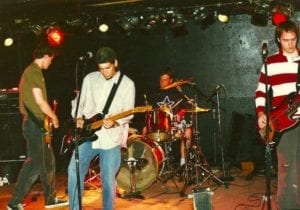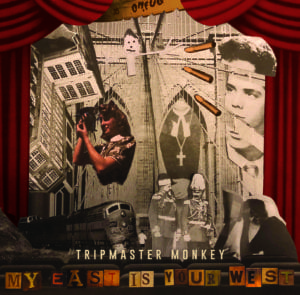Tripmaster’s Masterpiece: Their ‘East’ Is Their Best
 It was always stunning to me that Tripmaster Monkey never hit it bigger than they did. Back in the mid-late ‘90s, the band – singer Chris Bernat, guitarist and singer Jamie Toal, drummer Marty Reyhons and bassist Wes Haas – had everything going for them. They were of and in the zeitgeist, with a perfectly tuned sound aligned with the times, and had a brilliant string of killer tunes, from the dreamy “Shutters Closed,” to the Nirvana-pop of “Liquid Sky” to the heartbreaking alt-rock beauty of “Colts.” The songs were there, as good as anything else soaring through the stratosphere of the charts at the time, just waiting to be discovered. And for those of us, like the band, splashing into the unpredictable and strange pool of our twenties they struck those vital chords of exploding energy, wide-eyed velocity and burbling youthful idealism.
It was always stunning to me that Tripmaster Monkey never hit it bigger than they did. Back in the mid-late ‘90s, the band – singer Chris Bernat, guitarist and singer Jamie Toal, drummer Marty Reyhons and bassist Wes Haas – had everything going for them. They were of and in the zeitgeist, with a perfectly tuned sound aligned with the times, and had a brilliant string of killer tunes, from the dreamy “Shutters Closed,” to the Nirvana-pop of “Liquid Sky” to the heartbreaking alt-rock beauty of “Colts.” The songs were there, as good as anything else soaring through the stratosphere of the charts at the time, just waiting to be discovered. And for those of us, like the band, splashing into the unpredictable and strange pool of our twenties they struck those vital chords of exploding energy, wide-eyed velocity and burbling youthful idealism.
But for whatever reason, fate and luck didn’t shower them with the recognition they deserved, and the band found themselves dropped from major label Elektra Records, after which they disbanded, amicably, each going their separate ways. Bernat and Reyhons stayed local, while Haas and Toal went west to Oregon and California, respectively. Since then, they’ve reunited sporadically for one-off shows and projects, but have been largely quiet as a band.
Until now. A few months back, the group reunited in the studio with producer and friend Pat Stolley, new additional member Eric Stone, and additional producers Jacob Ross (guitar) and Jeff Konrad (digital production) and began working on “My East Is Your West,” which hits record stores and all various online streaming services this week, more than twenty years since their last full record, 1996’s critically-acclaimed but commercially-ignored “Practice Changes.”
Two decades later, it’s going to be tough for fate to be such a tease.
The group’s return album, “My East Is Your West,” is a fantastic, deep, expansive creation that showcases the band’s experience and maturity as individuals, as well as the sharpened studio abilities of the group and producer Pat Stolley. It’s the band’s best album, which is saying quite a bit, given their previous output.
Filled with terrific melodic and rhythmic surprises, playing that flows from loose and drifting to tight and angular, “MEIYW” feels like the butterfly to emerge from the cocoon of the group’s last major label record, their first with Stolley, “Practice Changes.” Whereas like the new record, “Practice” had no shortage of ambition, it realized it to varying degrees. It sounded like a final record by a group – one where they wanted to cram all of their ideas into one last hurrah. More of then than not, it worked, to spectacular effect, especially on tunes like “Colts,” “Anthem of the Interstate Army,” “Shirley on Pills” and “Sprocket Dick,” but in other moments the songs felt like they were going somewhere but hadn’t quite arrived.
There’s no sense of that on “MEIYW.” It’s not only a fully realized album, it’s a rich and dynamic one in its realization. It feels like the culmination of more than two decades of experience playing out, as the foursome and their production team now know exactly how to realize the ambitions for which they’re reaching. The layers of melody and counter-melody, the confidence in songwriting and performance, are stunning to hear. It’s more than I even expected, and that’s saying a lot, because my expectations were pretty damn high.

Part of that is because of what the band members have accomplished since the Clinton era. Haas has been largely under the radar, but Toal displayed the mastery of his songwriting ability with several intricate and sophisticated records with Tenki, Bernat grew his band Chrash from an esoteric indulgence to a clever rock force imbued with the quirky spirit of the Kinks, and Reyhons has become nothing short of one of the greatest rock drummers in local music history, the backbone of a wide-ranging array of quality acts from Einstein’s Sister to Jim The Mule to The Velies. Add Stolley into that mix, who has a resume boasting everything from Daytrotter genesis to multi-act producer to driving force behind several excellent records with The Multiple Cat, and you’ve got a formidable lineup of experience and talent.
And it’s all on display here.
The disc begins with the low hum and frantic time machine rhythmic fits of “Summer Bummer,” which breaks open into a majestic horizon of sound that doesn’t slow in its imagination or realization, switching rhythmic patterns and melodic jaunts with an ease that recalls the best of Pavement and announces that this is a record that’s going to set the bar high.
What’s remarkable is how each track clears it. “Ruined in Rouen” has a groovy post-punk feel out of late ‘70s New York, and “And Yet Maybe” has an airy melodic magic reminiscent of Manic Street Preachers.
One of the disc’s standouts, “My East Is Your West” is not only a musical high point but also one of Bernat’s finest lyrical moments on the record, a sly commentary on contemporary narcissism that goes beyond the obvious and delivers a shocking optimism where cynicism would’ve been de rigeur for most.
That’s followed by another Bernat high point, one of the most touching and revelatory songs, “Letter To Dresden,” a heartfelt conversation with his stepson that takes his love of wordplay and utilizes it as a bridge to childhood that’s absolutely fantastic, especially accompanied by the uplifting melodic and harmonic wizardry of the group.
The bittersweet “Jonathan’s Song” is probably the song which sounds most like their ‘90s output, feeling like something off “Practice Changes,” with its sing-song shifts and jittery rhythm.
The first single from the album, “Against It,” likewise has that familiar strum and shove ‘90s alt-rock feel, and rises to one of the funnest and catchiest tracks on the record, and the band’s cover of the St. Vincent’s “New York” is a rare tribute track that rivals the original and actually feels very late ‘60s Moody Blues, before they became pretentious and prog, with its chugging backbone being covered by lofting notes and a gauzy chorus. On both tracks, the underrated Haas and Reyhons shine, keeping the rhythm pocket tight while rolling from sinewy to shimmering passages.
“Antidote Shuffle” and “Silvis Blues” are lush and shambolic, gardens of various guitar hues, giving Toal a sonic playground to explore, especially on the latter as it runs from one guitar sound to the next against the backdrop of a musical bed reminiscent of ‘70s Rolling Stones.
 A mixup of early Who smash and burn, marching punk rock vocal buildups and grunge folk jangle, “Corduroy” ends the record on a high, a smart encapsulation of all that’s transpired before it and a fitting farewell after one hell of an aural journey.
A mixup of early Who smash and burn, marching punk rock vocal buildups and grunge folk jangle, “Corduroy” ends the record on a high, a smart encapsulation of all that’s transpired before it and a fitting farewell after one hell of an aural journey.
Will “My East Is Your West” do for Tripmaster Monkey what their earlier work should’ve done for them two decades ago, and bring their music the respect and prominence it deserves? Fate is always a fickle bitch when it comes to any success, especially commercially, but it’s going to be hard for any critic or listener to deny the wonderful musicality and creativity bubbling in technicolor from this record.
“My East Is Your West” isn’t just a welcome comeback from a band linked to the nostalgia of our youths, it’s a vital and contemporary record that stands alongside anything released since then. It feels just as it should – full of blood and fire and new life but girded by the steel and rust of time passed and experience gained. It’ll be interesting to see into which directions Tripmaster Monkey travels from here.













Leave a Reply
You must be logged in to post a comment.